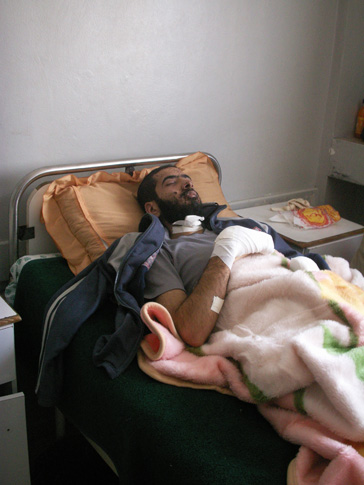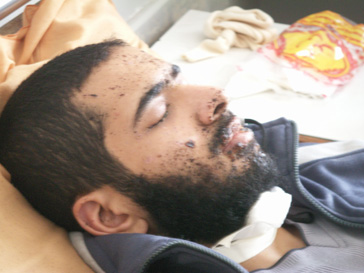
19 year-old Ali Abdl Salam Al Sa’ay walks like the living dead. Eyes closed, he hobbles into the examination room at Gaza city’s Nasser Eye Hospital, holding his bandaged hands gingerly in front of him. A relative walks alongside him, holding up his intravenous drip of antibiotics.
‘His right eye is lost’, explains his opthamologist, Dr Hafez Hani. ‘The globe is ruptured, due to an explosive injury. The contents of the eye are lost. There is no perception of light. There is nothing we can do but close the wound of the eye’.
More complicated, however, is the “intraocular infection” of the eye, which requires both systemic (intravenous) and topical (drops) antibiotics. ‘He will stay here until the infection subsides’, Dr Hafez continues.
In addition to losing his right eye, Ali has also lost his left hand and three fingers from his right hand. The “explosive injury” was caused by a missile fired from an Israeli gunboat off the Gaza shore on the morning of 10th January.
Ali, lying in bed, speaks softly, clearly in pain. His face is covered with a thousand tiny shrapnel wounds, marking his otherwise beautiful face. He recalls that the missile attack happened at 6:45am on the Tuesday morning. He and a friend had just left Ali’s house, and were heading down the beach towards his friend’s farm, where Ali was going to help out with some farm work. This was the first time they would return to the farm after the Israeli attacks - and in part they wanted to discover if there had been any damage done.
Approximately ten minutes after leaving Ali’s house in Gaza city’s al-Shati (Beach) refugee camp, a missile was fired at the young men, from the sea. ‘We couldn’t see any boats, because of the mist’, explains Ali. ‘But that area is full of [Israeli] gunboats. And it was too windy for planes to be out in that area’, he adds. The young men were quick, and, somehow, managed to run from the first missile. Shortly thereafter a second missile was fired on them. It hit both of them.
Ali’s friend was struck in the legs, whilst Ali himself was hit in the hands and face. ‘My friend’s injuries were not so serious, so he called the ambulance’, Ali recalls. It was 20 minutes before the ambulance arrived. ‘I was bleeding the whole time’.
Ali was taken to Kamal Adwan hospital in Jabaliya - to the north of Gaza city - rather than to the nearby Al Shifa hospital because ‘he called both hospitals. The Kamal Adwan ambulance got there first”. He was later transferred to Al Shifa, before being transferred again to the Nasser specialist eye hospital.
After explaining the extent of Ali’s injuries, Dr Hafez adds:
‘His is considered to be a mild trauma - even though he lost his eye and hands. If you saw Shifa hospital during the war - people with both limbs lost; eyes lost; brains out. Many doctors were traumatised by what they saw during that time’.

If Ali’s eye does not heal well, and continues to become infected, he may require evisceration - taking out the eye, explains Dr Hafez. ‘There have been many, many cases of evisceration due to the war’, he says. ‘All due to explosive injuries’.
Al Shati’ camp was particularly targeted during the Israeli war on Gaza. Shelling of the camp took place ‘24 hours a day’, explains Ali’s father, Abdul Salam. ‘All the houses that face the sea were evacuated. They fired from gunboats, planes, everything’.
Explosions in al-Shati’ camp continue, as Israeli gunboats continue to pound the camp. ‘Daiman, daiman (always, always)’, croaks Ali. His father adds, ‘It is getting normal for the people to hear the shooting. It’s like drums now. Many people are getting injured’.
‘They have no mercy’, declares Dr Hafez. ‘And no morals’.

No comments:
Post a Comment